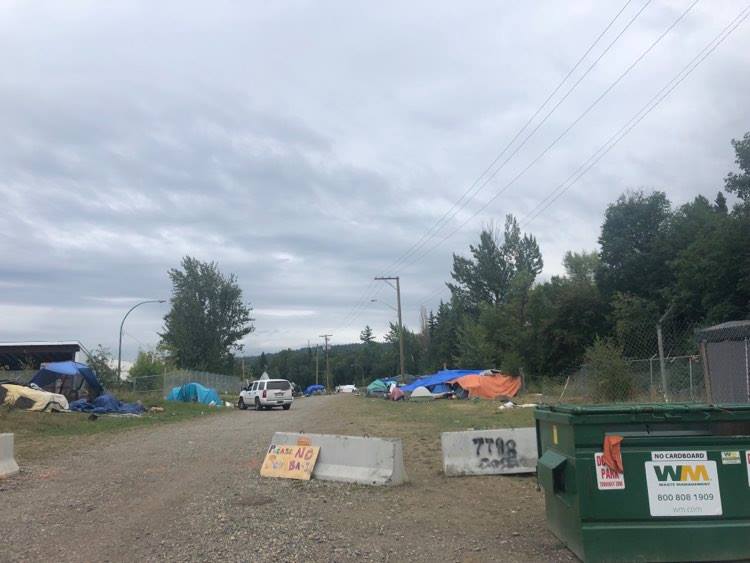A controversial bylaw that would see loitering and soliciting outlawed in the city of Prince George was passed during tonight’s (Monday) City Council meeting.
The Safe Streets Bylaw was introduced to try and help mitigate the complex issue around the homeless population, the opioid crisis, and the rise of crime in some areas of the city.
While everyone agreed that something needed to be done to deal with these issues, many people were in support, and many people were critical of this bylaw.
The BC Assembly of First Nations was the first group to give a presentation at the meeting.
“The issue of having a bylaw that is very punitive, that really, in essence, is punishing the poor for being poor is not the way to go,” said Chief Terry Teegee.
Teegee said they’ve been meeting with other First Nations organizations to try and find a way to better deal with the homelessness issue.
Dr. Joseph Hermer, an Associate Professor of Sociology from the University of Toronto who was introduced by Teegee, said this is one of the worst bylaws he’s come across.
“Isolation can kill vulnerable people and isolation of this sort is one of the main driving factors driving the overdose deaths generally, and particularly the isolation suffered during the pandemic,” said Hermer.
“We are ill-equipped, the city of Prince George is ill-equipped. The province and the federal government are ill-equipped. But if we can come together and figure out a solution perhaps the city of Prince George can be a template,” said Teegee.
Together We Stand gave a presentation mirroring these sentiments and highlighting the issues they saw in the new bylaw.
Amelia Merrick with the organization said she thinks Prince George is experiencing growing pains, and that she agrees that the city has a problem.
“This is about systemic racism and discrimination, it’s about entrenched poverty, it’s about a limited stock of affordable housing, it’s about an increase in toxic drug supply and overdoses, and it’s about a severe shortage of social services,” said Merrick.
She added many organizations had to stop, discontinue or change social services that they offered during the pandemic.
Merrick said education, owning up to what the problem is, and bringing the community together to get support from the provincial and federal government were extremely important.
The Millar Addition Connaught Concerned Citizens Committee gave a presentation in support of the bylaw and gave some first-hand accounts of what living near homeless encampments is like.
One of the presenters, Alissa Nyheim-Rivet, said the community of Millar Addition has experienced things like indecent exposure, theft, vandalism, vehicle theft, public intoxication and open drug use with people passed out in entrances to buildings.
“There has been attempted sexual assault and sexual harassment. In one case, a woman was chased by a man with his pants down and another neighbour had to intervene. This man was released because it was due to a drug-induced psychosis,” said Nyheim-Rivet.
Another presenter, Tammy Hull, said the conditions at the encampment were inhumane, and allowing it to continue confirmed that it was okay for people to live like that.
“Most people feel great compassion for the homeless and wanted adequate housing provided for them. But this can’t come at the cost of safety, not for the tent city, and not for the people of Millar Addition.”
After the presentations, the council moved to discuss the bylaw.
“So let’s talk about a few of these items, panhandling, let’s not pretend that this doesn’t and hasn’t gone wrong,” said Councillor Terri McConnachie.
“People going about their business have been verbally threatened, spit on, and in other physical ways assaulted. Let’s not pretend that there are not lives that have been forever changed as a result.”
“And let’s not forget that this did not escalate to people being attacked at gunpoint while sitting in a drive-thru,” added McConnachie.
Councillor Cori Ramsay said she was in opposition to the bylaw because she believes it will have an opposite effect.
“We are going to see more destructive behavior, it’s going to increase crime and vandalism and the lawlessness that we are seeing occurring. It’s going to break the trust that we have and it’s going to make it harder to progress on this issue in the long run.”
She added that this was a bandaid solution and advocacy was needed to get what the community needs.
Councillor Brian Skakun said he would not make excuses for anyone’s behavior on the street, and the bylaw is about getting compliance and changing behavior.
“This bylaw wasn’t just crafted on a Sunday night by administration. There was a lot of support at the time, and I think I was fully supported by council and their direction was to create a bylaw to try and make our streets safer,” said Skakun.
Councillors Brian Skakun, Susan Scott, Kyle Sampson, Terri McConnachie, and Mayor Lyn Hall were all in support of the bylaw.
Councillors Cori Ramsay, Frank Everitt, and Murry Krause were against the bylaw, and Councillor Garth Frizzell was not at the meeting.
The city council meeting also had another presentation on the Stormwater Management Plan that could potentially see taxes raised by 4%, and the renaming of O’Grady Road was discussed, with the city moving to consult the public on what it should be changed to.
Something going on in the Prince George area you think people should know about?
Send us a news tip by emailing [email protected].






